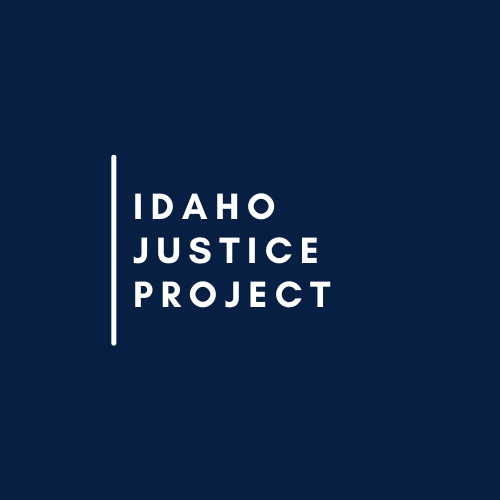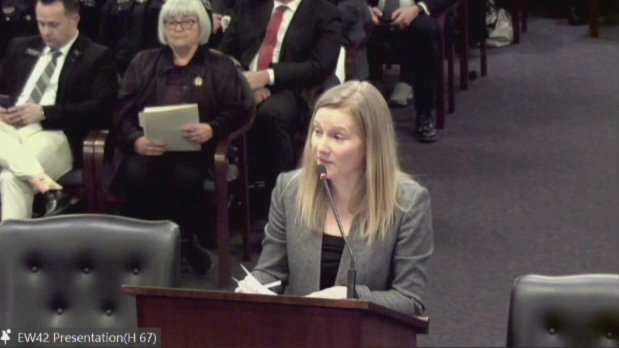We are building a community of advocates, parents, loved ones, individuals directly impacted by the system, system stakeholders, and nonprofits to call for action to reduce the number of people in our prisons for mental health challenges or substance use. Idaho is the only state in the country where the largest percentage of people incarcerated on Dec. 31, 2020 were in prison for a drug offense rather than a violent crime.
We are working to expand access to community-based treatment for mental health and substance use disorder that will allow individuals to thrive at home with their families, strengthen our communities, and make Idaho a safer place to live for all of us.
How do we do this work?
-
We connect with system stakeholders, officials, and nonprofit service providers to understand their perspectives on the issues facing our state. We host regular community meetings to bring the public together to share stories, connect, discuss a plan, and ultimately take action for change. We educate and empower individuals impacted by the justice system to take action. If you want to join us at our next meeting, stay up to date on our meeting schedule by following the Idaho Justice Project on Facebook.
-
Idaho is set to receive more than $200M over the next two decades as part of a historic settlement agreement between the manufacturers and distributors of opioids and the state. As of May 2023, the state has received $26M in funds. The Idaho Opioid Settlement Intrastate Allocation Agreement outlines that, as funds are received, the state shall receive 40% of the funds, 40% will be distributed to the counties and other local governments, and 20% will go to the public health districts. Funds may only be used for “opioid abatement strategies.” However, this definition is broad and includes anything from treatment for opioid use disorder, connecting people to recovery, and addressing the needs of criminal-justice involved persons, to preventing the misuse of opioids, supporting first responders, and funding leadership planning and training.
Idaho Justice Project is working to educate the public about the existence of the Opioid Settlement Fund and empower the community to become part of the public comment process to make sure that those closest to the problem are part of the decision-making process. We are also tracking and reporting the use of opioid settlement funds so the public is aware of how these funds are being directed.
In June 2023, Idaho Justice Project hosted a virtual community workshop to educate the public about the settlement funds and to empower individuals to submit comments to the Idaho Behavioral Health Council on how it recommends the state use its allocated portion of funds.
Check out the public comment that Idaho Justice Project submitted to the Idaho Behavioral Health Council.
-
In partnership with the Boise State School of Social Work, Attorneys of Idaho, and other defense attorneys and social workers across the state, Idaho Justice Project is part of an exciting new project to expand holistic defense in Idaho.
What is holistic defense? The term “holistic defense” has a broad and varying definition but generally refers to a client-centered and interdisciplinary model of public defense that incorporates comprehensive advocacy in the criminal proceeding with access to non-legal services that seek to address and remedy the circumstances driving many individuals into the criminal justice system, affecting their engagement in their defense, and affecting their potential outcomes in their legal case and beyond. For our project, holistic defense is defined as a holistic, client-centered, collaborative approach that pairs defense attorneys with trained criminal defense-based forensic social workers to improve outcomes for indigent persons in the criminal justice system. Stated simply, a holistic defense model partners defendants with social workers to assist with things like seeking treatment for substance use issues before trial, analyzing the defendant’s past history so the judge fully knows the person he or she is sentencing, getting the client access to counseling and therapy while awaiting trial, and stabilizing the client’s life to increase the odds that probation, rather than incarceration, is ordered, by helping the client secure housing, obtain services, and address other issues as needed.
Who is using a holistic defense model in Idaho right now? The Office of the Ada County Public Defender and Kootenai County Public Defender each employ a full-time licensed social worker. Unfortunately, the availability of social workers to defendants is currently restricted primarily to clients in larger population centers across the state, and even in those more densely populated areas, the capacity for a holistic defense model is severely limited.
How will this group expand holistic defense in Idaho? The project partners are working to create a pilot program to connect 3-5 rural county defender offices in Idaho with advanced study social work interns from an accredited M.S.W. (Master of Social Work) degree program. The partners will pair each defender or contract attorney office with an advanced social work intern that will be supervised by a licensed clinical social worker with an extensive background in partnering with defense attorneys to provide forensic social work services. The project partners will provide training and resources to partner defense attorneys and social work interns to ensure that all program participants feel supported and will collect data about the pilot program to study and document its effects and to make any adjustments to the program as necessary in the future.
-
Right now, in Idaho, you can be sentenced to a long mandatory minimum period of incarceration for possession of certain quantities of marijuana, cocaine, methamphetamine, and heroin. Idaho Justice Project is working to amend this law, I.C. § 37-2732B, to allow judicial discretion where the individual is being charged under the statute for the first-time and has a non-violent past. As the law stands now, the statute does not distinguish between individual users and large scale dealers. To ensure justice is served in each case, Idaho Justice Project is advocating to bring judicial discretion back for many drug offenders.
Every case and individual is different–so sentencing should be case by case. In January 2023, Idaho Justice Project launched Case by Case Idaho to spread the word about Idaho’s mandatory minimum sentencing. See how mandatory minimums are impacting Idaho families.
Idaho Justice Project envisions an Idaho with fewer people in prison and more people thriving in the community after accessing the mental health or drug treatment they need. We are grateful for the work of law enforcement and appreciate the important role they play in this process. We also appreciate the important role of judges. To ensure justice in each case, we believe it is critical for judges to hear from both the prosecutor and the defense, to be well-informed about the facts of a case, and to issue a sentence that considers the severity of the crime as well as the background of the individual and their potential for being receptive to treatment.
According to data summaries received directly from the Idaho Department of Corrections, in November 2022, there were 304 people in IDOC custody serving a mandatory minimum under I.C. 37-2732B. Of these individuals:
80% have no violent criminal history,
56% have no prior drug record in Idaho, and
In 2022, Idaho taxpayers paid nearly $9M to imprison first-time trafficking offenders.
In February 2023, Idaho Justice Project engaged many members of the community to share their stories with lawmakers in a hearing about a bill that would have added a new mandatory minimum to this statute. After mobilizing more than 100 people to submit testimony, sign up to testify online or live, or meet with their lawmakers, the Idaho House Judiciary and Rules Committee voted NO to adding a new mandatory minimum stopping the bill from moving forward. You can check out the full hearing video from the February 9, 2023 hearing here.




